

You Are Not Alone: On Being A Queer Survivor. This piece contains content relating to rape, substance abuse and eating disorders.

I’m sharing my story for a number of reasons. The first reason is that on the most basic level, it helps to share. Sometimes we survivors feel very alone. We might tell ourselves that no one understands, or that no one wants to hear what we have to say. I would like you to know that you are not alone. The second reason is that being a queer survivor has its own unique bundle of burdens and trials, and when looking for support, it was hard for me to find resources on how to deal with gender and sexuality as a survivor. ★ ZINZIN ZINE ★ - Boîte à outils pour les luttes des personnes psychiatrisées. 4 Things People Do That Harm Survivors of Sexual Violence. TW/CW: this article discusses sexual assault/violence as well as gaslighting of a sexual assault survivor By Gloria Oladipo Sometimes, to shame the devil, we have to share our secrets.

Recommandations de lecture : C-PTSD. Malheureusement, je n’ai pas de références francophones à proposer pour le moment, mais j’espère que ça changera bientôt !
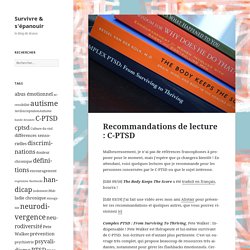
En attendant, voici quelques lectures que je recommande pour les personnes concernées par le C-PTSD ou que le sujet intéresse. Fiche d’information sur le trauma. Je recommande régulièrement le travail du Dr Igor Thiriez, psychiatre qui publie sur son blog un grand nombre de fiches informatives précises et synthétiques.
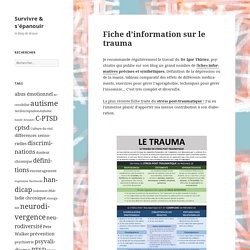
Définition de la dépression ou de la manie, tableau comparatif des effets de différents médicaments, exercices pour gérer l’agoraphobie, techniques pour gérer l’insomnie… C’est très complet et diversifié. Symptômes du stress post-traumatique complexe au quotidien. 13 étapes pour gérer les flashbacks. Avec la gracieuse permission de Pete Walker, j’ai traduit son texte “13 steps for managing flashbacks“, une ressource précieuse pour les personnes expérimentant des flashbacks du fait du stress post-traumatique.
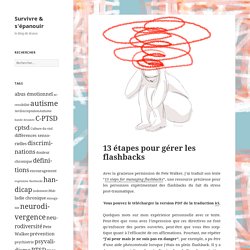
Vous pouvez le télécharger la version PDF de la traduction ici. Quelques mots sur mon expérience personnelle avec ce texte. Peut-être que vous avez l’impression que ces directives ne font qu’enfoncer des portes ouvertes, peut-être que vous êtes sceptique quant à l’efficacité de ces affirmations. Pourtant, me répéter “J’ai peur mais je ne suis pas en danger”, par exemple, a pu être d’une aide phénoménale lorsque j’étais en plein flashback. About Fight, Flight, Freeze and Fawn responses. This paper describes a trauma typology for differentially diagnosing and treating Complex Post Traumatic Stress Disorder.
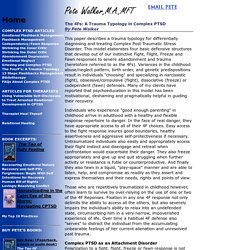
This model elaborates four basic defensive structures that develop out of our instinctive Fight, Flight, Freeze and Fawn responses to severe abandonment and trauma (heretofore referred to as the 4Fs). Variances in the childhood abuse/neglect pattern, birth order, and genetic predispositions result in individuals "choosing" and specializing in narcissistic (fight), obsessive/compulsive (flight), dissociative (freeze) or codependent (fawn) defenses. Many of my clients have reported that psychoeducation in this model has been motivational, deshaming and pragmatically helpful in guiding their recovery.
Individuals who experience "good enough parenting" in childhood arrive in adulthood with a healthy and flexible response repertoire to danger. In the face of real danger, they have appropriate access to all of their 4F choices. Self-Assessment. Codependency, Trauma, and Fawn Response. The East Bay Therapist, Jan/Feb 2003 In my work with victims of childhood trauma (I include here those who on a regular basis were verbally and emotionally abused at the dinner table), I use psychoeducation to help them understand the ramifications of their childhood-derived Complex PTSD (see Judith Herman’s enlightening Trauma and Recovery).
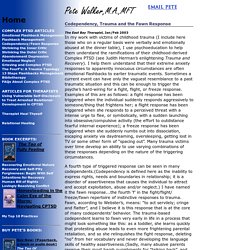
I help them understand that their extreme anxiety responses to apparently innocuous circumstances are often emotional flashbacks to earlier traumatic events. 13 steps for managing flashback. We Can't Out-Smart Mental Illness without Emotional Intelligence — Rest For Resistance. “It’s not what you said, but how you said it.”

The age old rebuttal seems to come up over and over again during uncomfortable conversations with loved ones. This is the tricky thing about communication. We can have the tools but not put them in the right configuration. We can have all of the intentions to carefully cradle our friends’ hearts like a newborn baby while we listen to exactly what made the day defeating. We intend to empathize. "We All Deserve to Heal": 4 Steps to Move through Survivor's Guilt — Rest For Resistance. CN: sexual violence, abuse In many methods of healing from trauma, confronting shame is often central to the process.
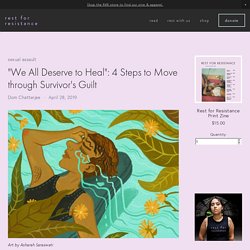
Free up shame, get out from under the blame placed on survivors, and healing is supposed to get easier. A helpful chart to explain the difference between support and 'toxic positivity.’ - GOOD. Via George.Bremer / Flickr A Helpful Chart to Explain the Difference Between Support and 'Toxic Positivity" was originally published on The Mighty.

There's no denying that positivity can be powerful. Dissociating When Triggered by Intimacy: A Guide to Check In, When Checking Out — Rest For Resistance. “I have never had a client who has dissociated. I haven’t heard of that. What is it like?” How unprocessed trauma is stored in the body. When all is well, our brain is the greatest supercomputer on earth. A complex network of about 100 billion neurons, it’s not only great at processing and organising information — it’s really, really fast.
Every second, somewhere between 18 and 640 trillion electric pulses are zipping through your brain. Am I ‘Traumatized Enough’ For a Complex PTSD Diagnosis? – Let's Queer Things Up! Crazy Talk is a mental health advice column, getting real about life with a mental illness. While I’m not a medical doctor, I’m living the good life with depression, OCD, and complex trauma, unapologetically owning my “crazy.” We’re talking all things mental health — trauma, happy pills, mood episodes, and whatever else you tweet me about!
Books about Healing PTSD, Complex PTSD and Dissociative Disorders. Many pregnant women were sold the fairytale of "the right thing to do" but the ensuing tragedy of the loss of their babies has profound effects for many mothers. This book explores myths and realities of adoption, and different methods of healing the mother’s wounds, including inner child work, visualizations, healing affirmations, and anger management. Amongst Ourselves is a self-help guide written by a psychologist with DID and her partner. This books is for people with DID, and the provides the practical steps you can take to cope, and emerge with greater self-awareness and the skills to live a rich and rewarding life. A partner's view is also included. People-pleasing can be a result of trauma. It’s called ‘fawning’ — here’s how to recognize it. – Let's Queer Things Up!
When I recently wrote a Twitter thread about my people-pleasing tendencies, I didn’t at all expect for it to go viral. Yet that’s exactly what happened. As I shared my experiences with trauma and people-pleasing, I was hit with an avalanche of emotion. So many of you could relate to this phenomenon known as “fawning,” and it became immediately clear that we needed this resource to exist outside of Twitter. MÉCANISMES. Page élaborée à partir des travaux du Dr Muriel Salmona sur les mécanismes psychologiques et neurobiologiques psychotraumatiques. Réflexions sur les usages du trigger warning. Avertissement : Cet article comprend la description d’une crise de panique, la mention de troubles psychologiques, il mentionne également les agressions sexuelles ou non sans en faire la description et comporte la description de propos invalidant ces troubles psychologiques.